New laws are needed to make Britain’s election rules fit for the digital age, the Electoral Commission has said – as it warned that trust in the democratic system was being undermined by new underhand campaigning techniques.
In its research for a new report on the 2019 election the UK’s democracy watchdog found that 58 per cent of people agreed that in general “campaigning online is untrue or misleading”.
The Commission said that in particular changes to the law are required to make targeted political advertising fair, after parties at the last election used platforms like Facebook to “micro-target” different messages at specific people in specific areas.
Download the new Independent Premium app
Sharing the full story, not just the headlines
“We have signalled our concern about these issues before. If voters lose trust and confidence in political campaigning, democracy as a whole will suffer,” the Commission said in its report.
“Campaigners, candidates and parties themselves need to take greater responsibility for the presentation and content of campaigns they run and the impact of their activities on public confidence in elections.”
Demanding immediate action from the government, they added: “We cannot afford to miss the window of opportunity between now and the next scheduled general election. There needs to be real change to protect trust and confidence in campaigns at future elections and the integrity of our democracy.”
The Commission said that “digital tools and channels have changed the campaigning landscape in the UK significantly” and “concerns about transparency are beginning to overshadow” potential benefits for greater engagement.
It said it should become a legal requirement for social media companies to make clear who is behind political advertising, and for providers like Facebook and Google to be more specific about who adverts are targeted at.
Currently, Facebook gives information as broad as “England” or “Scotland” when explaining where adverts are targeted, but gives advertisers much closer control and the ability to target them at particular demographics in a particular constituency.
The Commission also said the amount of money campaigners spend on ads should be more accurately disclosed, instead of providing a range, and that unpaid political campaigning should be labelled as political material and have to include the usual disclaimer.
The latest news on Brexit, politics and beyond direct to your inbox
The Commission also criticised certain practices by political parties during the election, stating:
“Some campaigners branded their social media pages in ways that meant it wasn’t clear who was responsible for them, or used misleading website links to encourage people to visit their sites; other examples used edited video clips to present their opponents negatively.”
Though the Commission did not name a political party, the Conservatives attracted criticism during the campaign for setting up a fake “fact-checking” service and using it to endorse Boris Johnson on social media during televised debates.
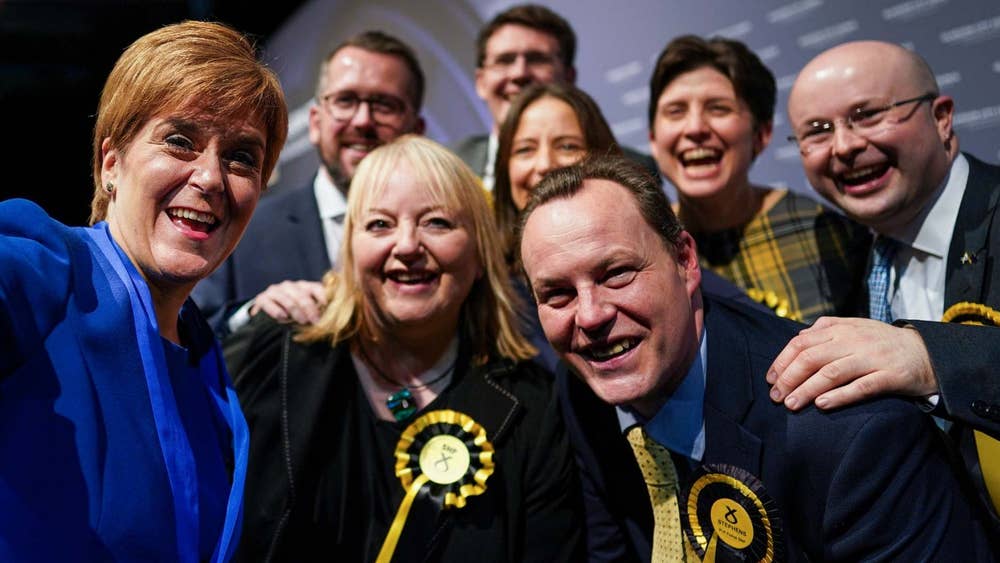
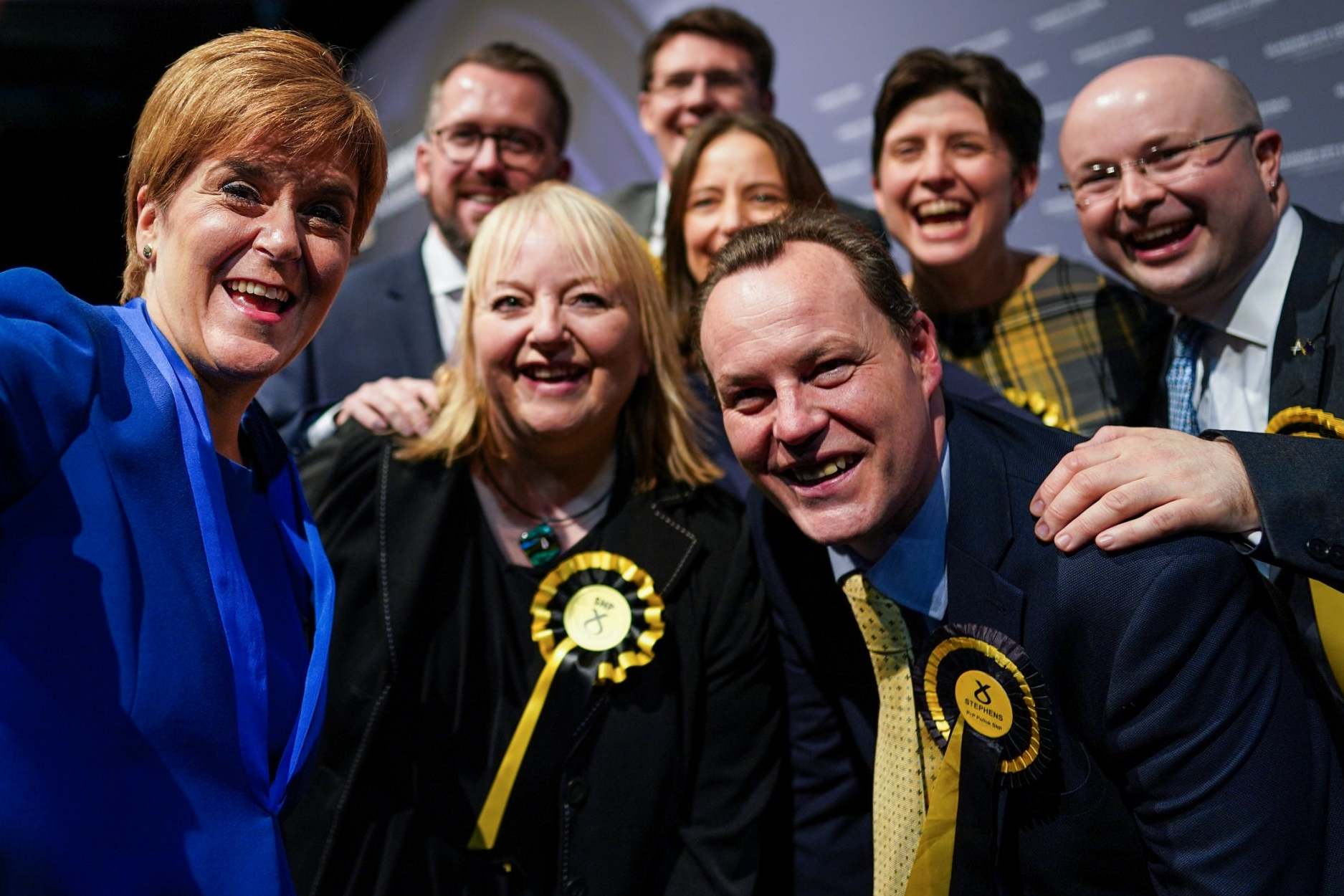
1/36
First Minister Nicola Sturgeon, takes a selfie with some her newly elected MP’s at the Glasgow count
Getty
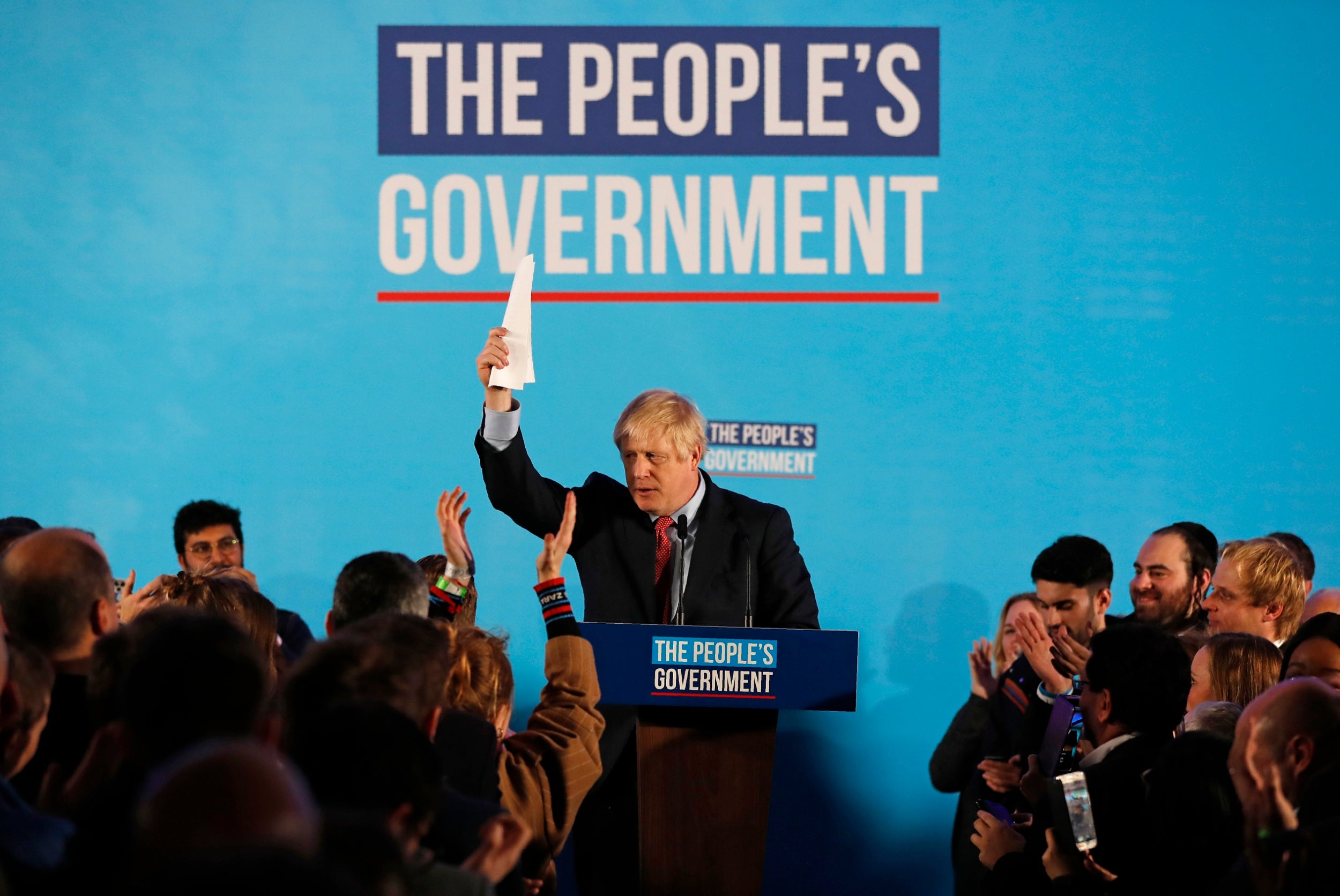
2/36
Prime Minister Boris Johnson gestures after speaking
AP
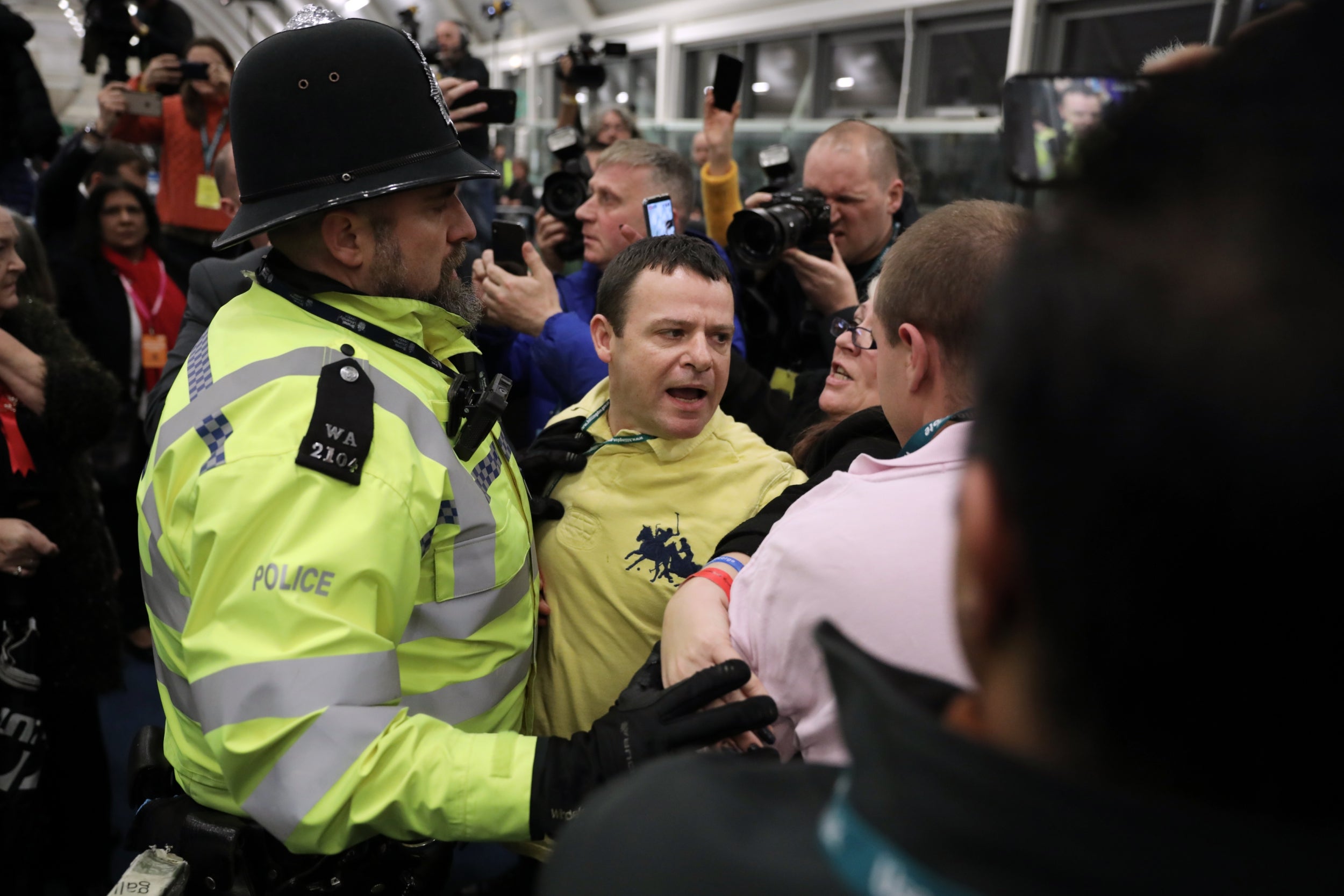
3/36
A police officer breaks up a fight while Hayes and Harlington MP John McDonnell speaks
Getty Images
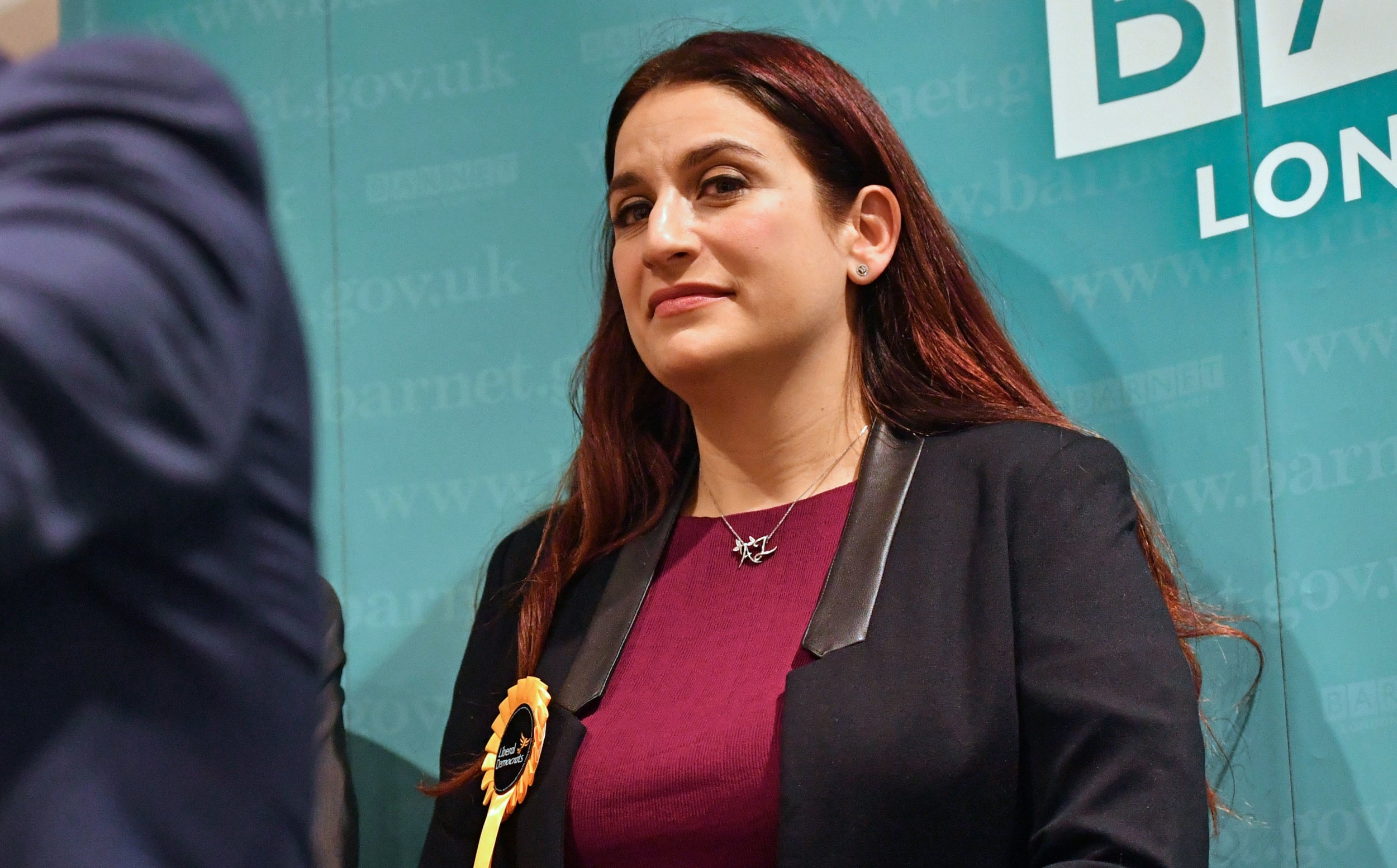
4/36
Liberal Democrat candidate Luciana Berger reacts as she loses the Finchley & Golders Green constituency in north London
PA

5/36
DUP MP for Upper Bann Carla Lockhart with her son Charlie at Meadowbank Sports Arena as counting begins
PA
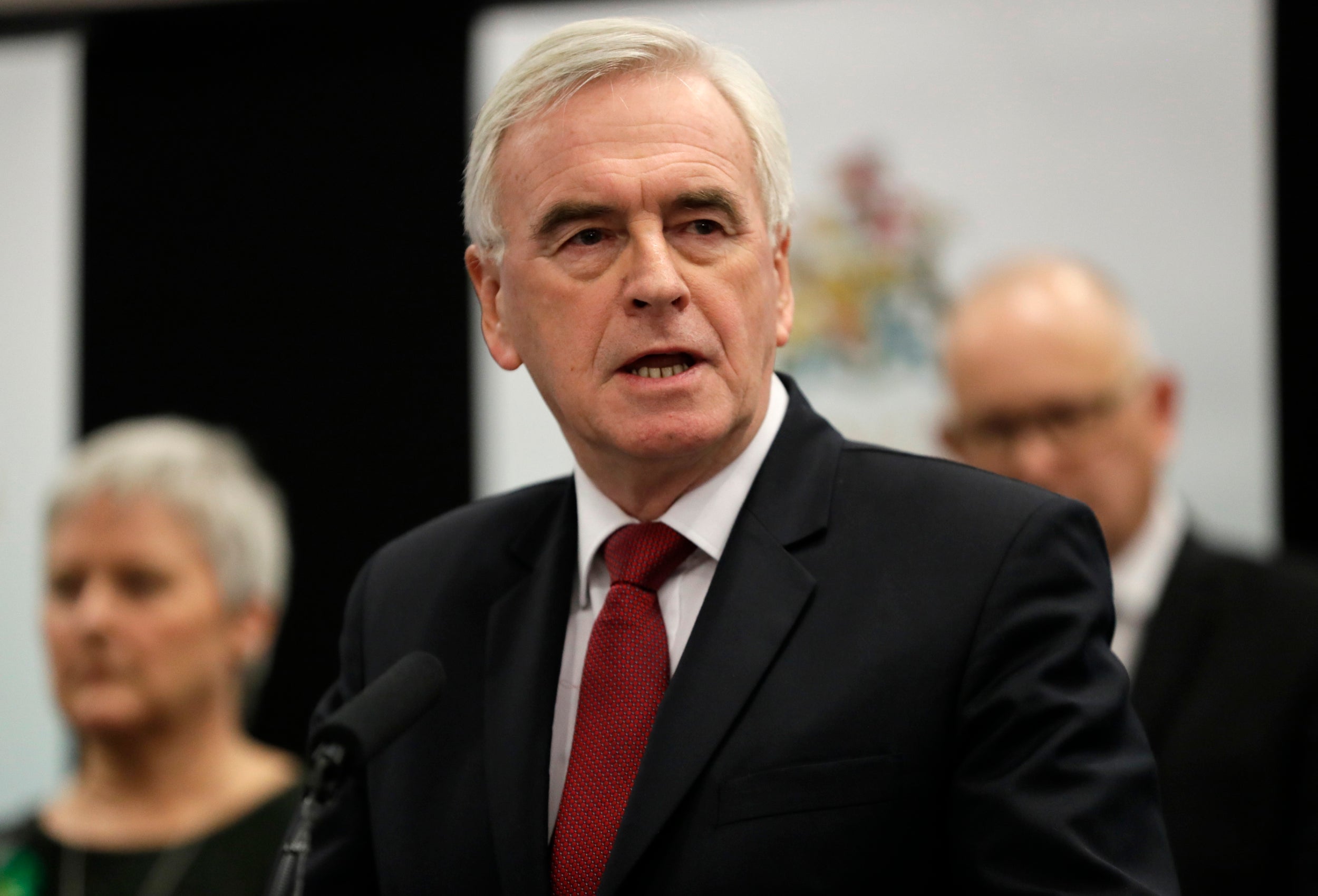
6/36
Labour’s John McDonnell, the Shadow Chancellor speaks after winning his constituency seat following the count declaration at Brunel University in Uxbridge, London
AP
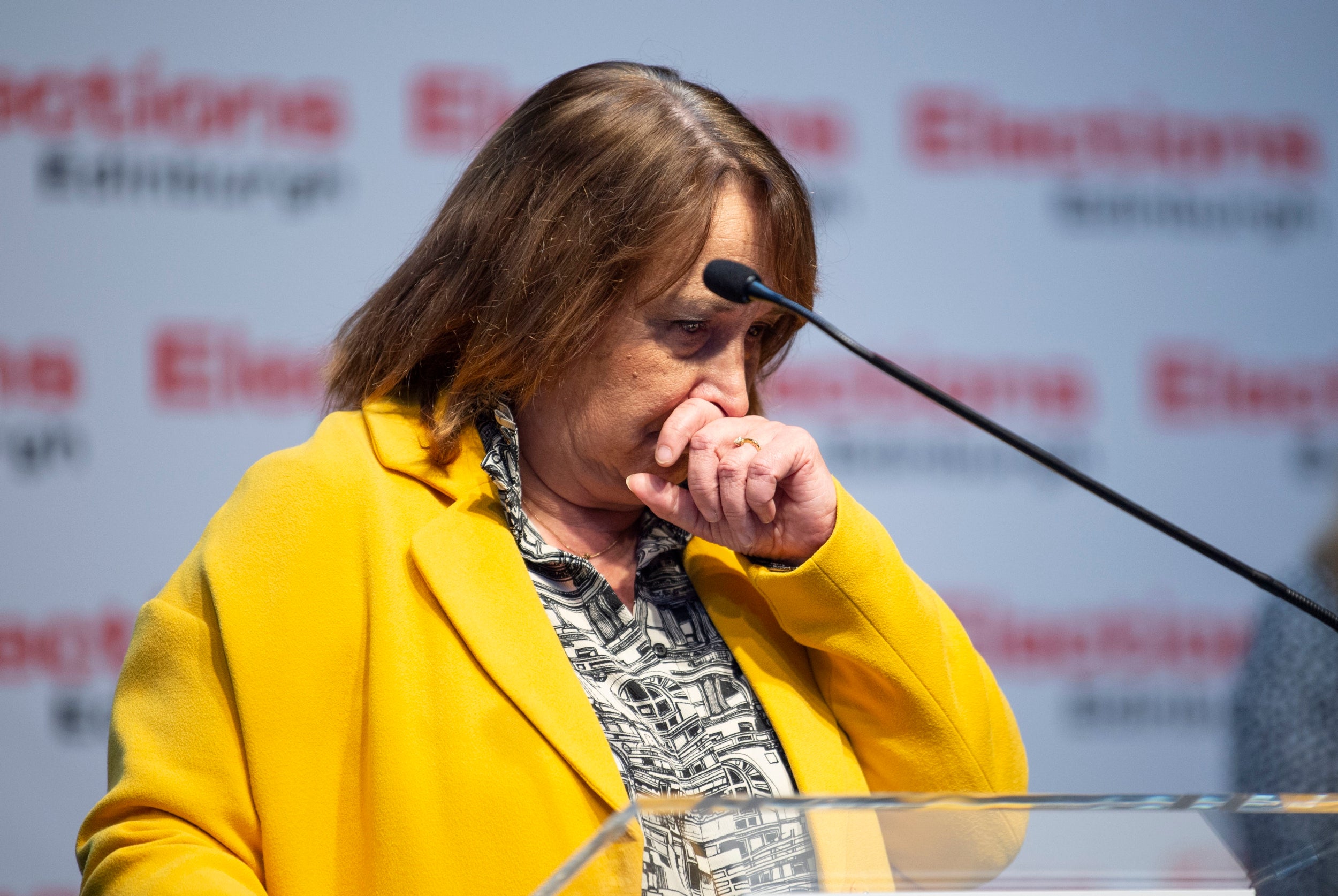
7/36
Liberal Democrats candidate for Edinburgh West, Christine Jardine retains her seat at the Royal Highland Centre, Edinburgh
PA
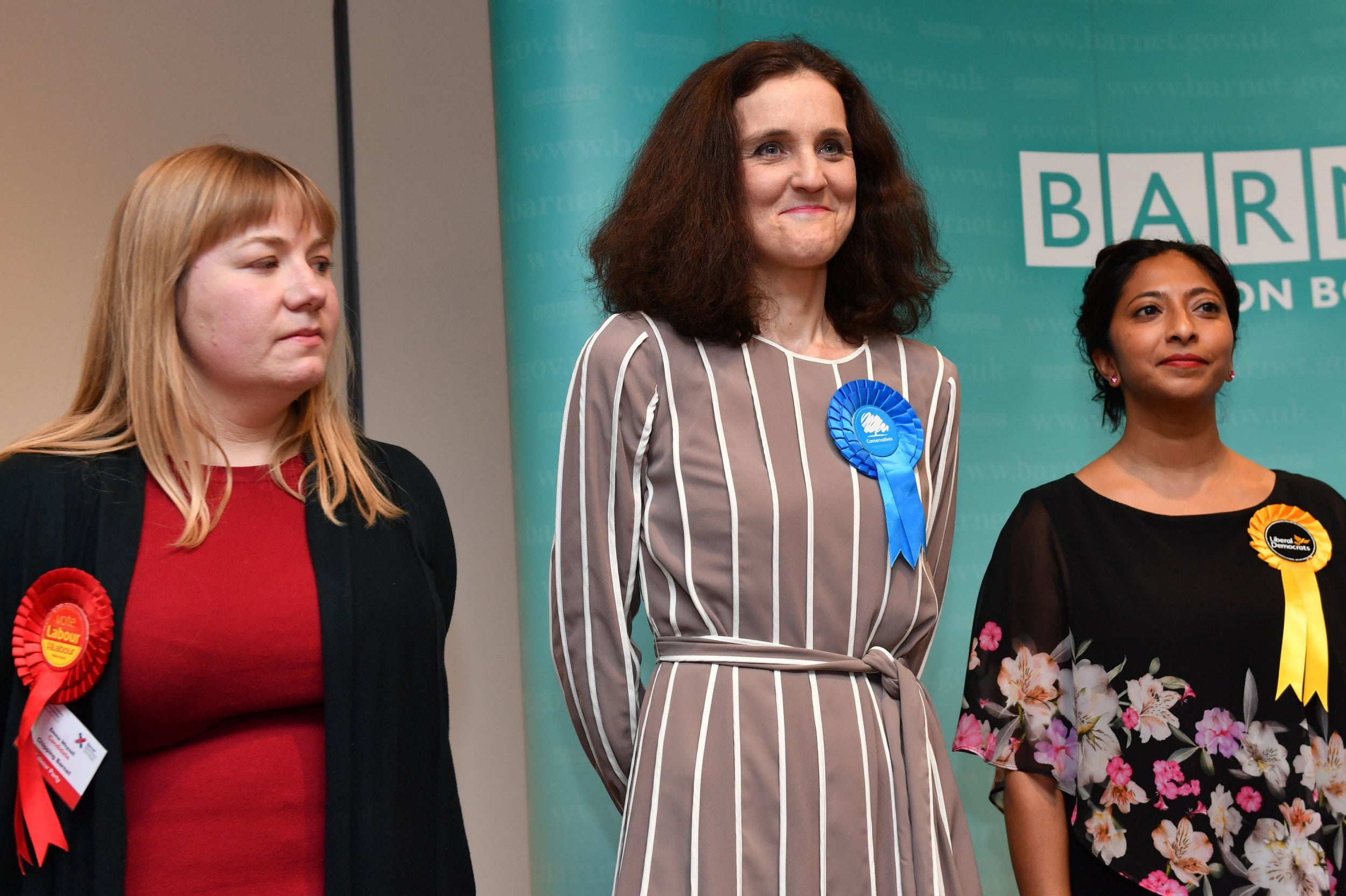
8/36
PA
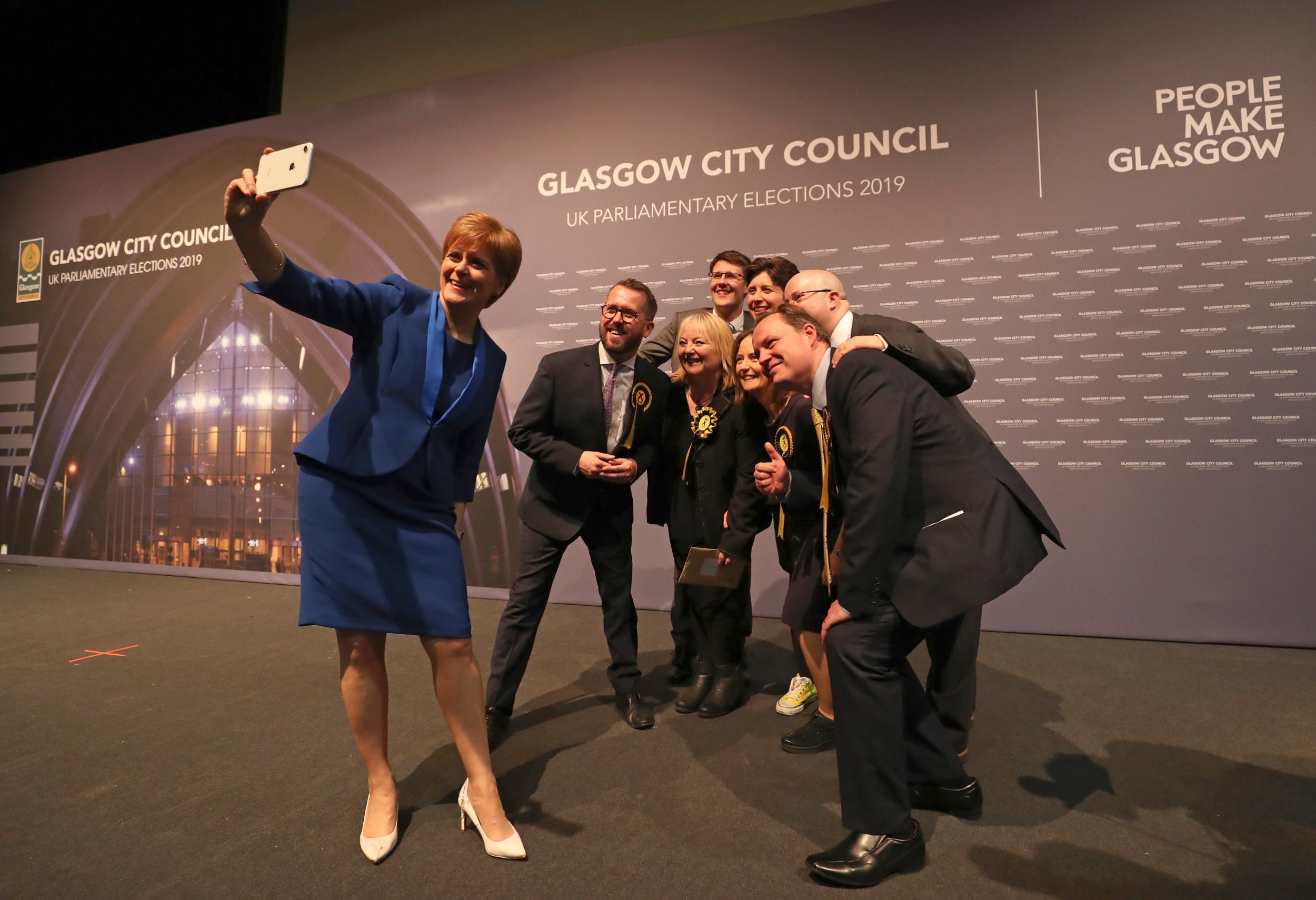
9/36
AP
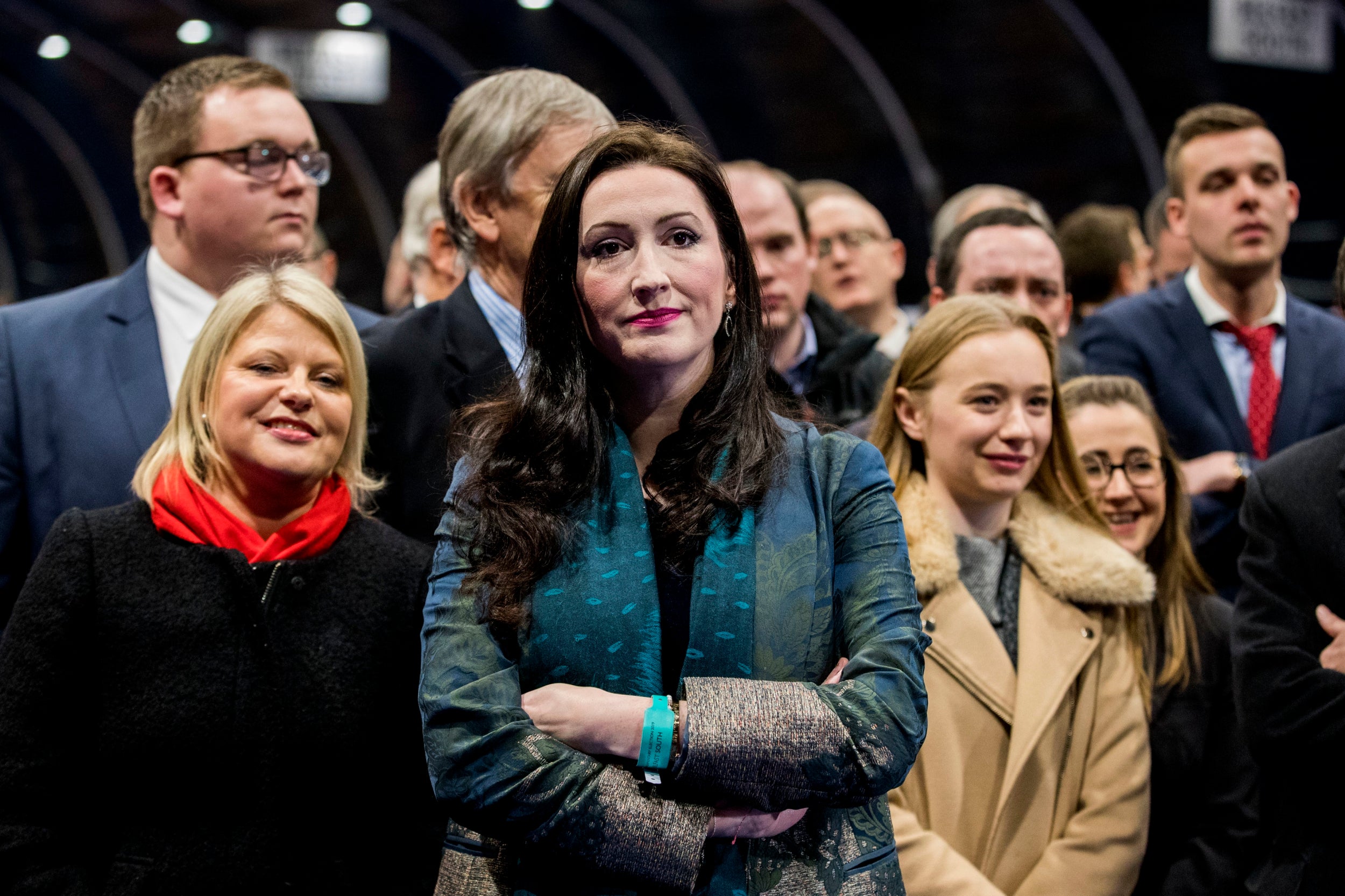
10/36
PA
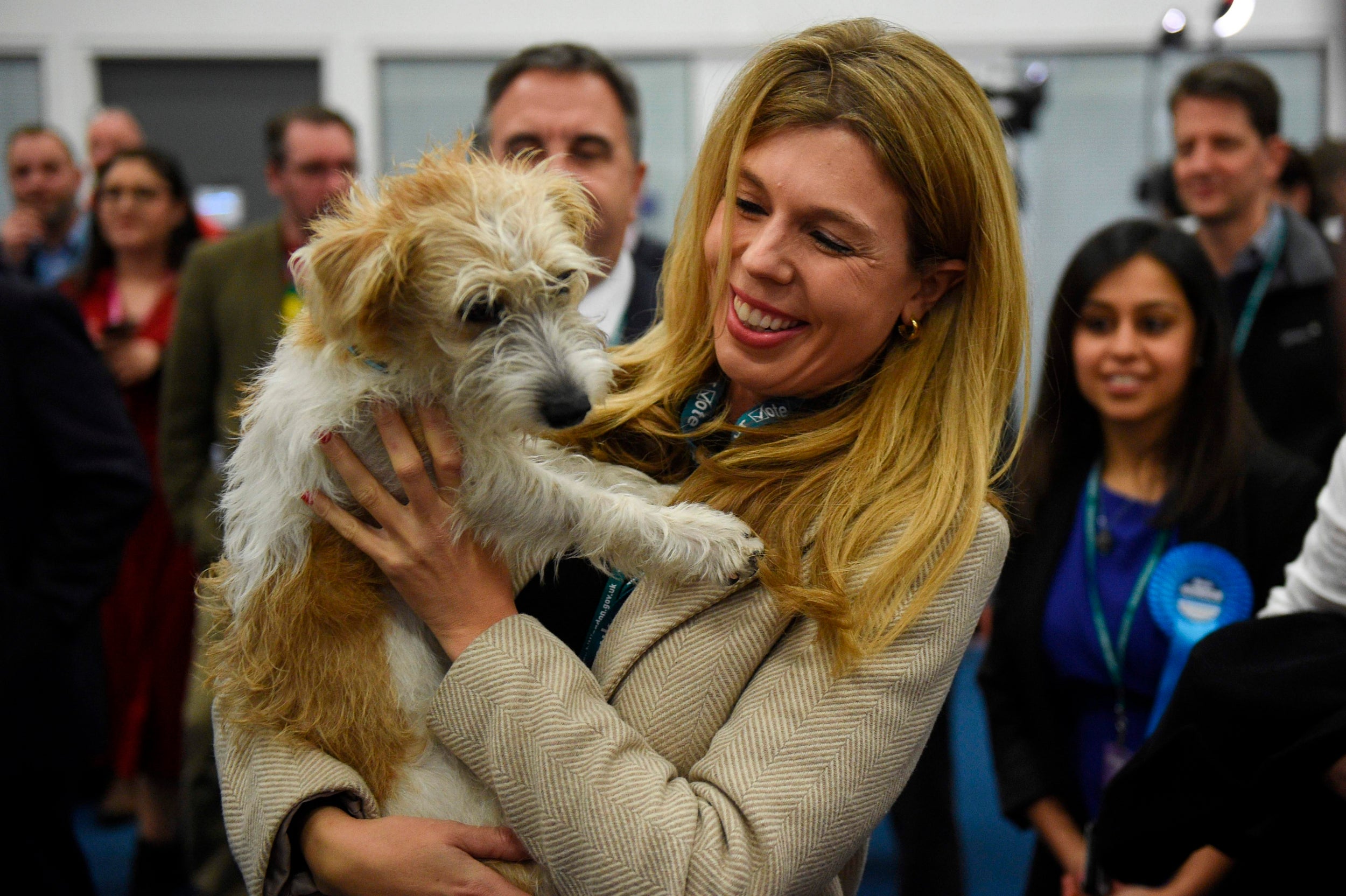
11/36
AFP via Getty Images
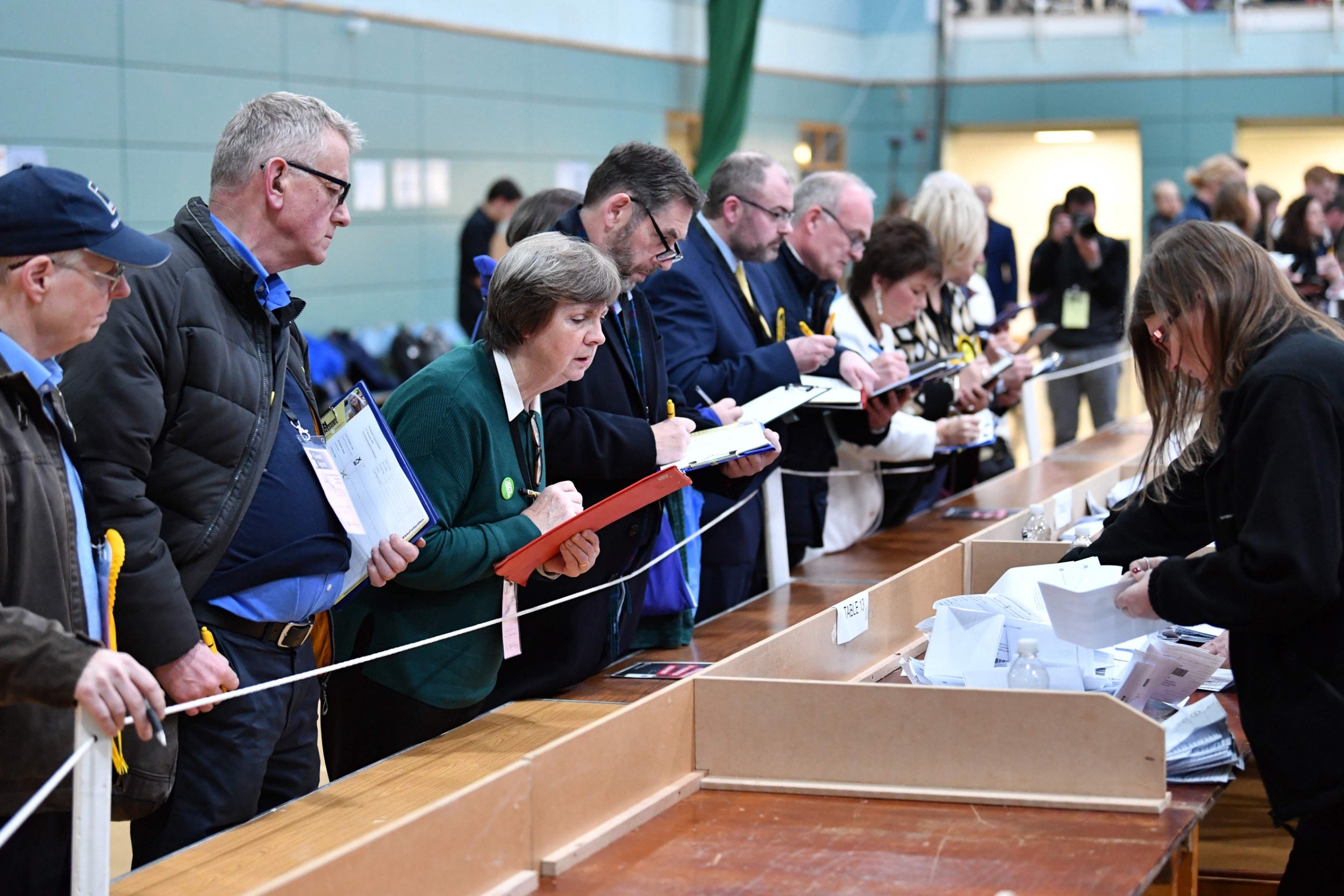
12/36
AFP via Getty Images

13/36
DUP leader Arlene Foster watches on as Sinn Fein candidate John Finucane is declared the winner of the north Belfast seat over DUP candidate Nigel Dodds in the Belfast count centre at the Titanic Exhibition centre on December 13, 2019 in Belfast, United Kingdom. The current Conservative Prime Minister Boris Johnson called the first UK winter election for nearly a century in an attempt to gain a working majority to break the parliamentary deadlock over Brexit. The election results from across the country are being counted and an overall result is expected in the early hours of Friday morning.
Getty Images
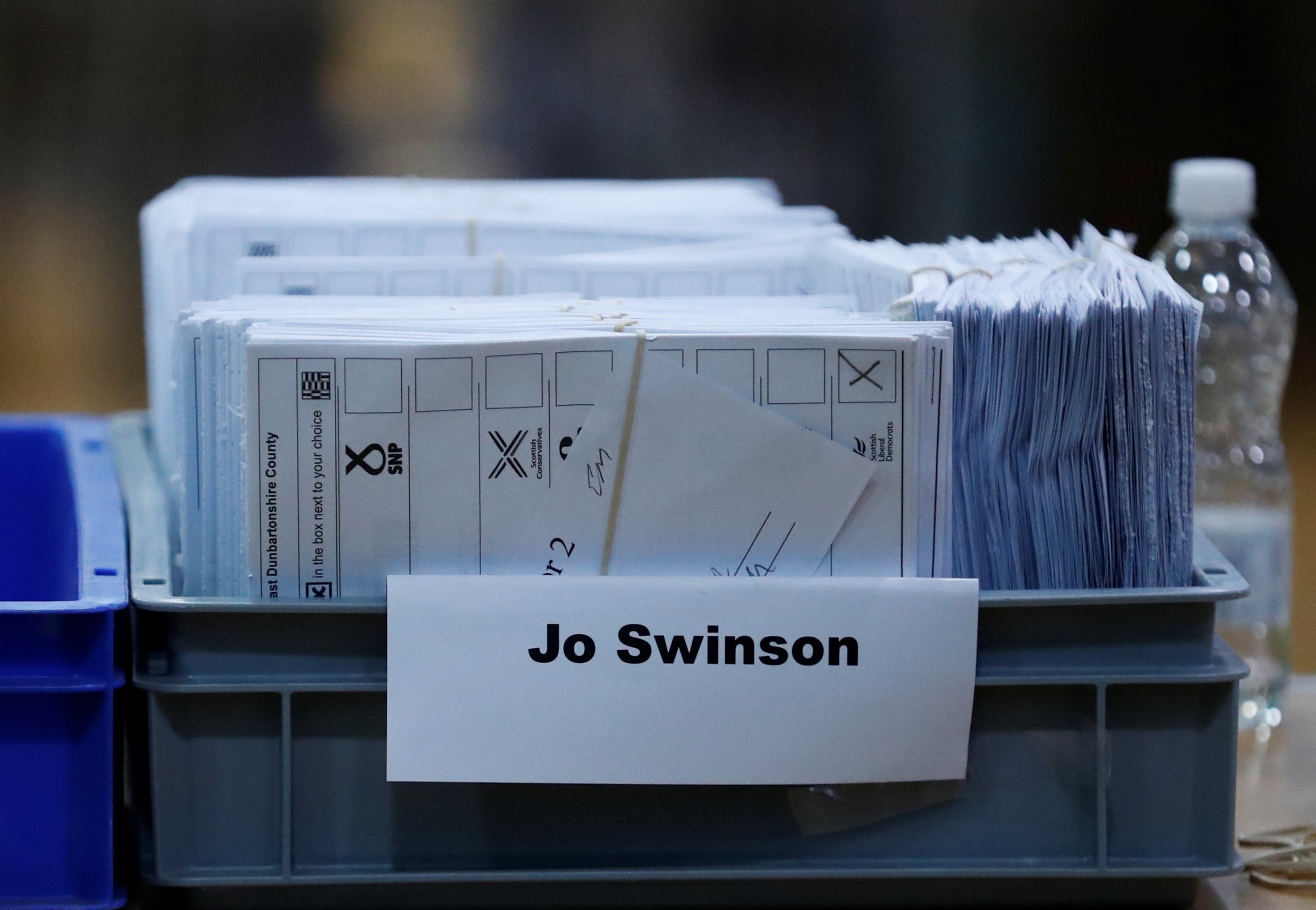
14/36
Ballots in a tray labelled Jo Swinson, Liberal Democrats candidate for East Dunbartonshire, are seen at a counting centre for Britain’s general election in Bishopbriggs, Britain
REUTERS
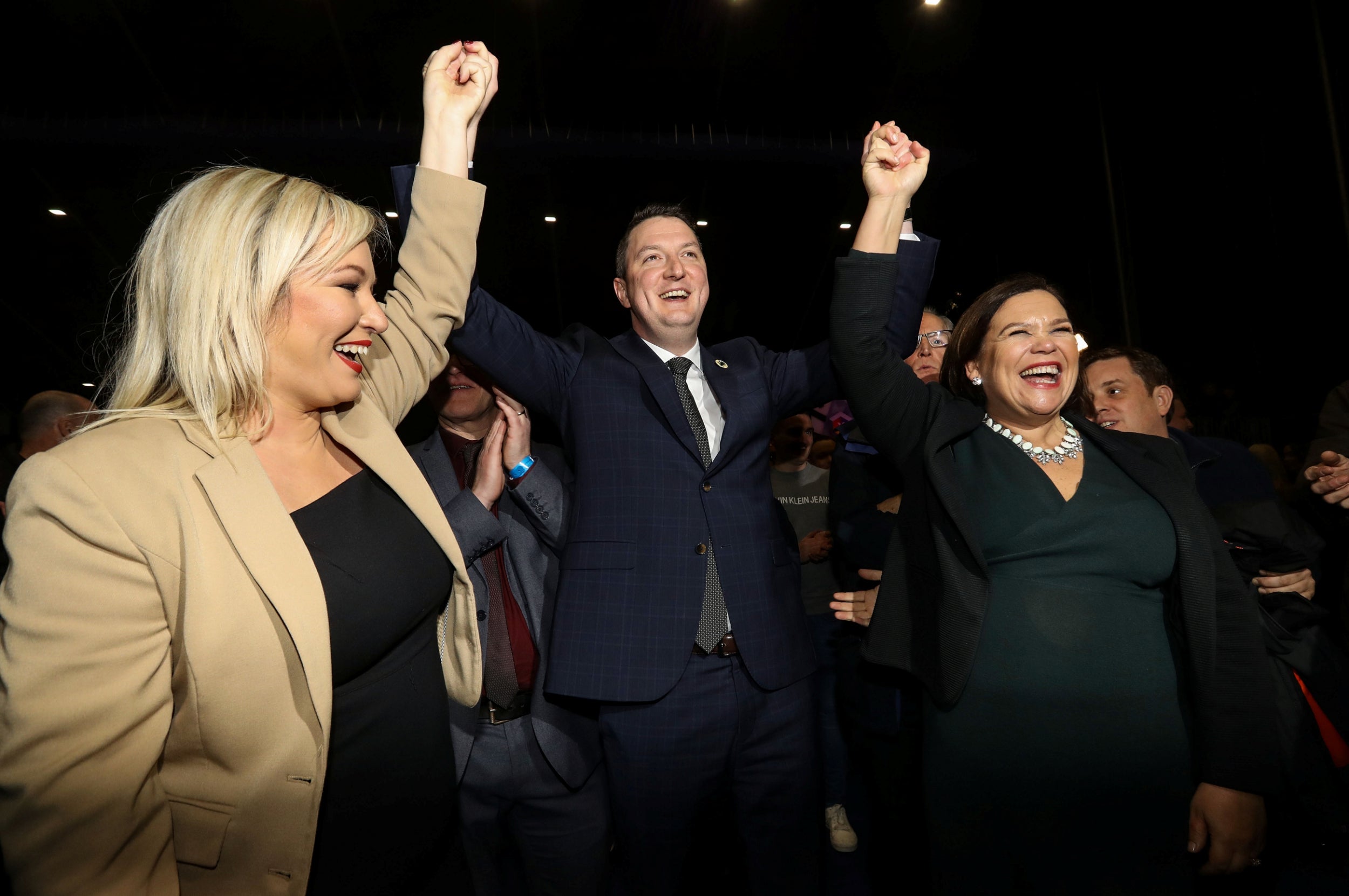
15/36
Sinn Fein’s John Finucane, the winning candidate in the Belfast North seat, with Party Vice President Michelle O’Neill and President Mary Lou McDonald, celebrates at the count centre, Titanic Quarter, Belfast, Northern Ireland
REUTERS

16/36
Scottish First Minister Nicola Sturgeon smiles as she arrives at the SEC Centre in Glasgow for the declaration in her constituency in the 2019 general election, Friday Dec. 13, 2019. An exit poll in Britain’s election projects that Prime Minister Boris Johnson’s Conservative Party likely will win a majority of seats in Parliament. That outcome would allow Johnson to fulfil his plan to take the U.K. out of the European Union next month.
AP

17/36
Conservative Party MP Dominic Raab being congratulated by Baron Badger after being re-elected to serve the constituency of Esher and Walton at Sandown Park Racecourse in Surrey at the 2019 General Election.
PA
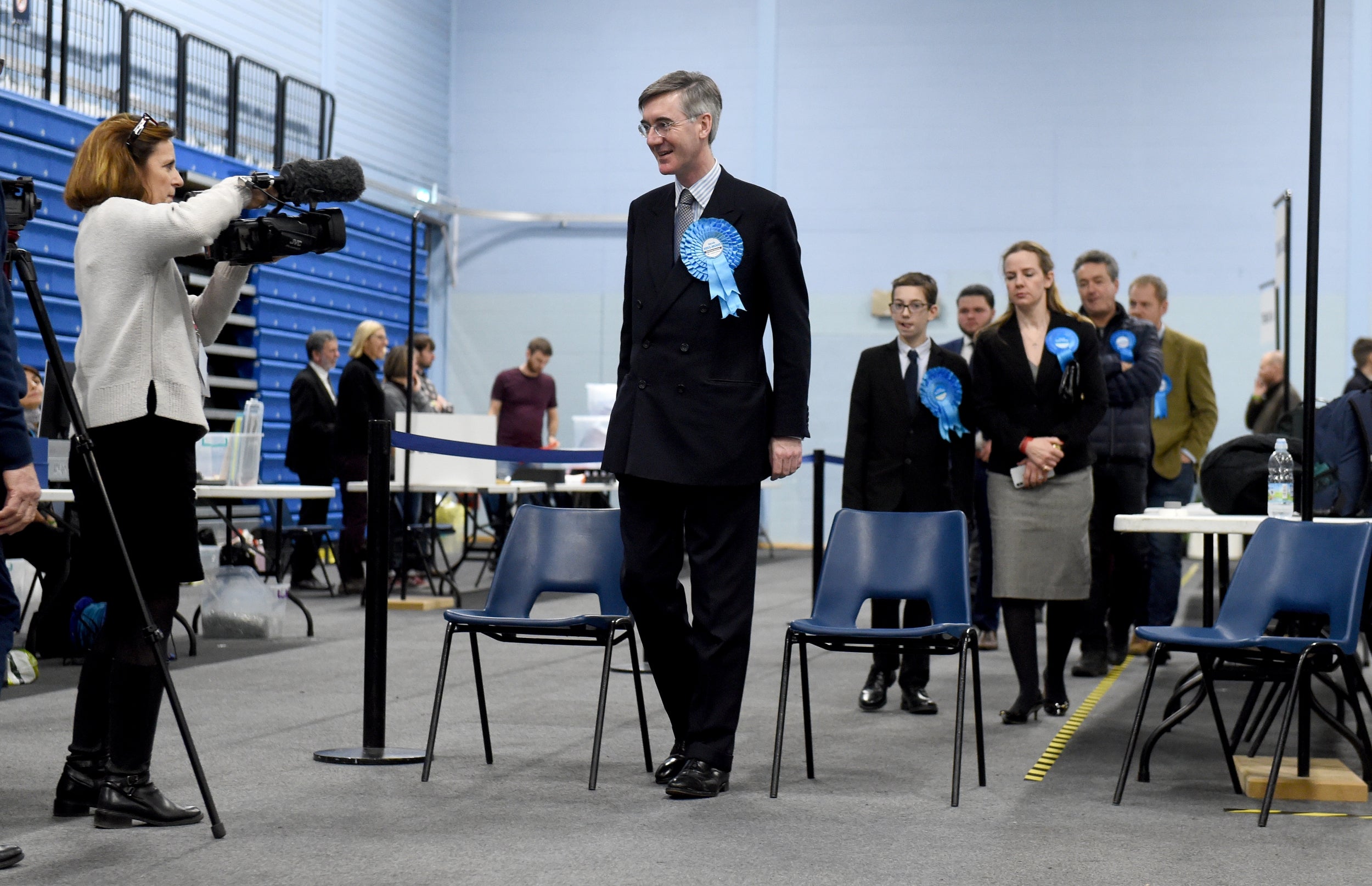
18/36
Conservative Party parliamentary candidate Jacob Rees-Mogg makes his way to the stage at the Sports Training Village, University of Bath, on December 13, 2019 in Bath, England. The current Conservative Prime Minister Boris Johnson called the first UK winter election for nearly a century in an attempt to gain a working majority to break the parliamentary deadlock over Brexit. The election results from across the country are being counted overnight and an overall result is expected in the early hours of Friday morning.
Getty Images
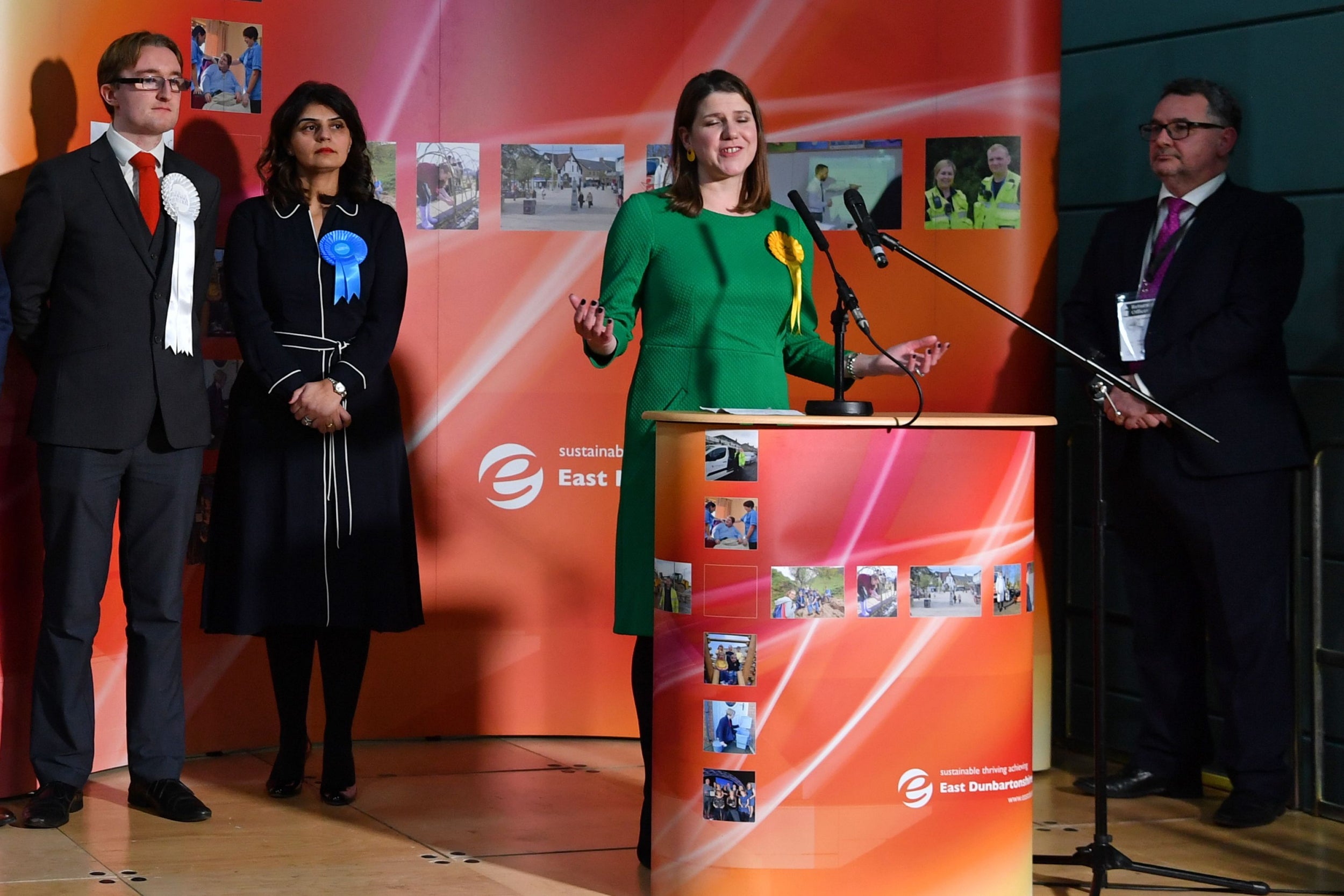
19/36
Britain’s Liberal Democrat leader Jo Swinson speaks on stage after losing her seat at the East Dunbartonshire count centre in Bishopbriggs, north of Glasgow, on December 13, 2019 after votes were counted as part of the UK general election.
AFP via Getty Images
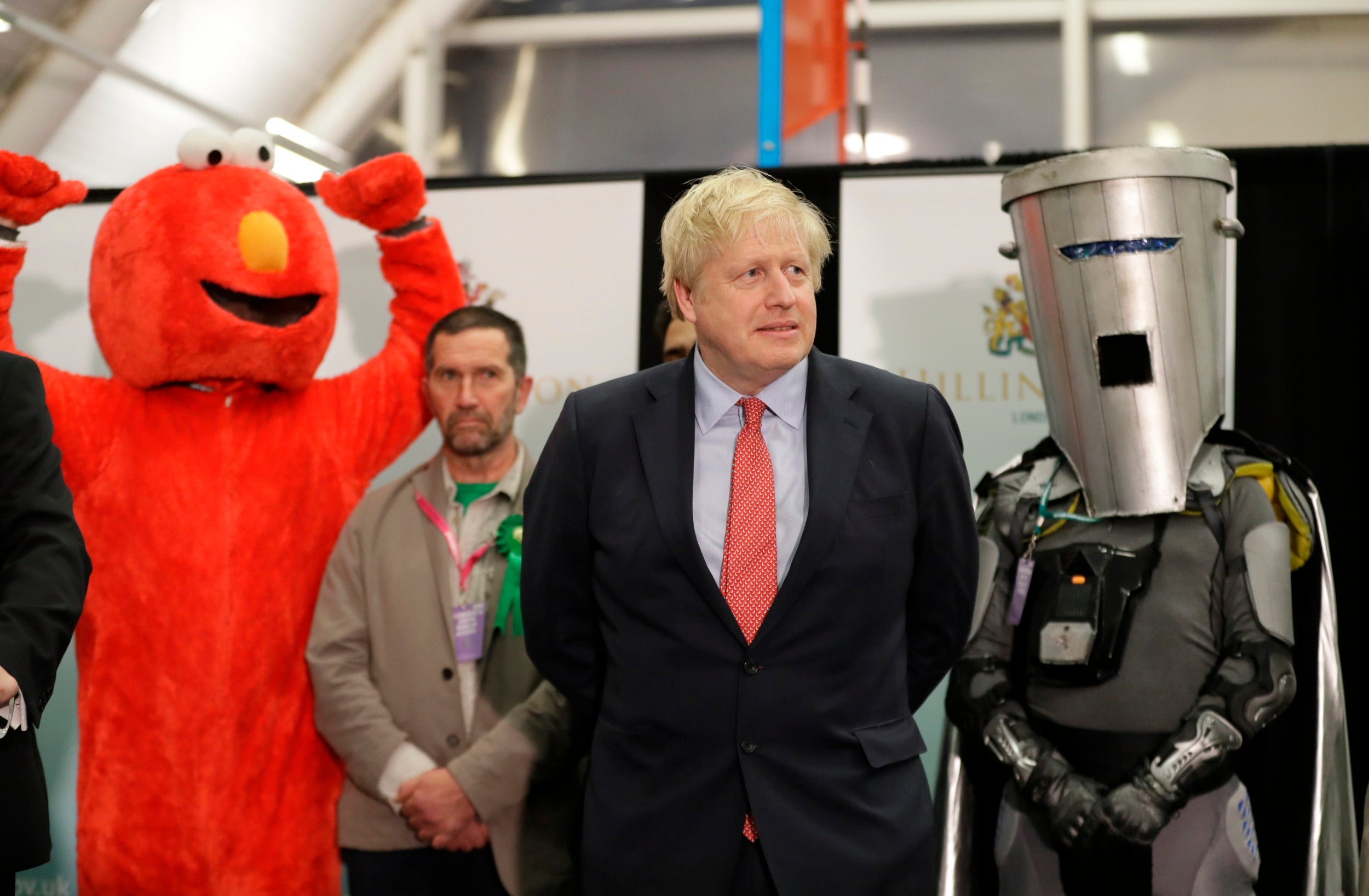
20/36
Bobby Smith, a political and fathers’ rights activist and founder and leader of the ‘Give Me Back Elmo’ party, left, and Independent candidate Count Binface stand either side of Britain’s Prime Minister and Conservative Party leader Boris Johnson wait for the Uxbridge and South Ruislip constituency count declaration at Brunel University in Uxbridge, London, Friday
AP
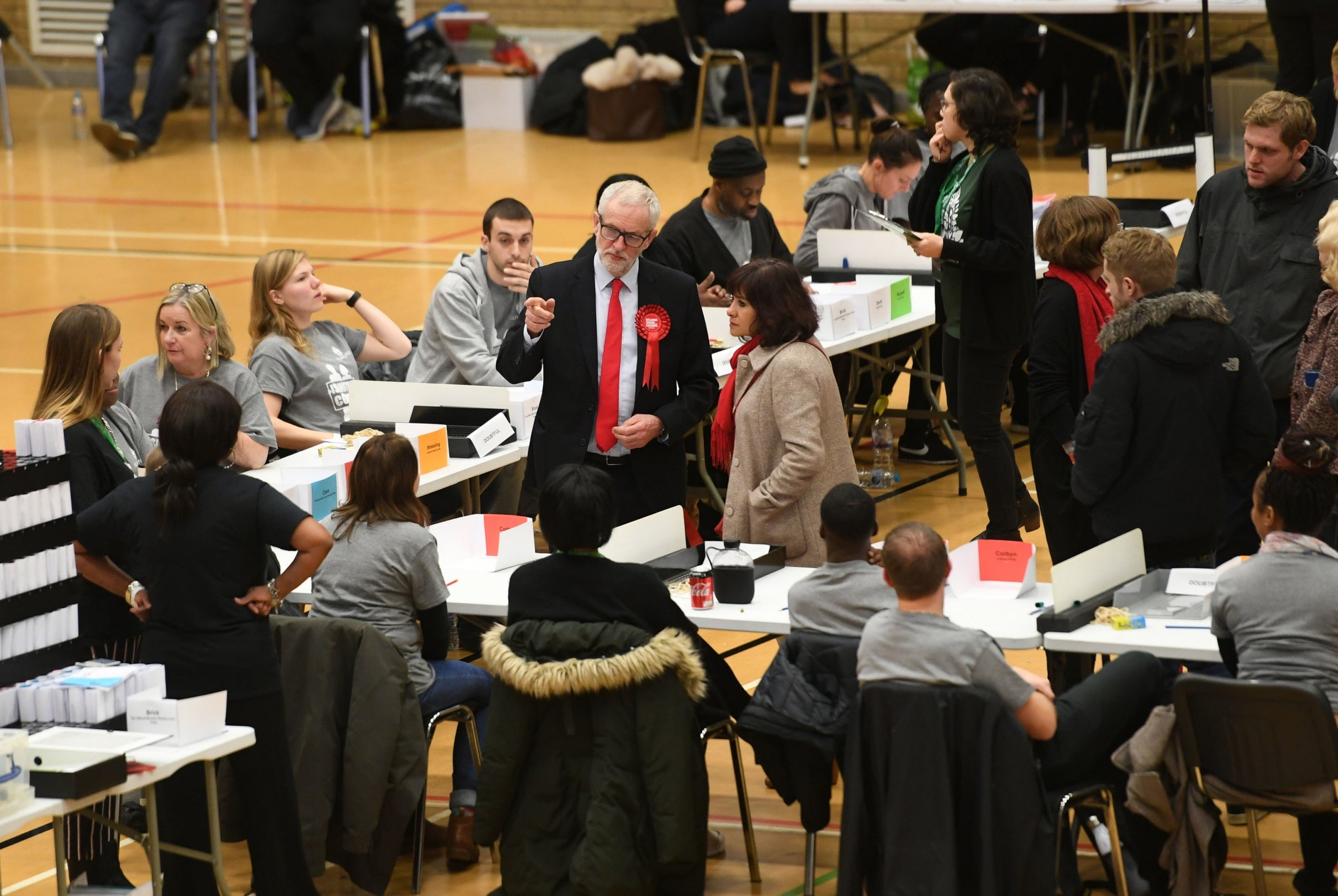
21/36
Labour leader Jeremy Corbyn, with wife Laura Alvarez, talks to workers as he arrives for the count at Sobell Leisure Centre for the Islington North and South constituencies for the 2019 General Election.
PA

22/36
Jeremy Corbyn, leader of the Labour Party, visits the vote count in his Islington North constituency on December 12, 2019 in London, England. Corbyn, who has held the Islington North seat since 1983, is expected to step down as leader if his party is dealt a decisive defeat by the Conservatives, led by Prime Minister Boris Johnson. The Prime Minister called the first UK winter election for nearly a century in an attempt to gain a working majority to break the parliamentary deadlock over Brexit. The election results from across the country are being counted overnight and an overall result is expected in the early hours of Friday morning.
Getty Images

23/36
Labour Party candidate Sharon Hodgson speaks after is announced as the winner for the constituency of Washington and Sunderland West at a counting centre for Britain’s general election in Sunderland, Britain
REUTERS

24/36
Labour leader Jeremy Corbyn arriving for the count at Sobell Leisure Centre for the Islington North and South constituencies for the 2019 General Election.
PA
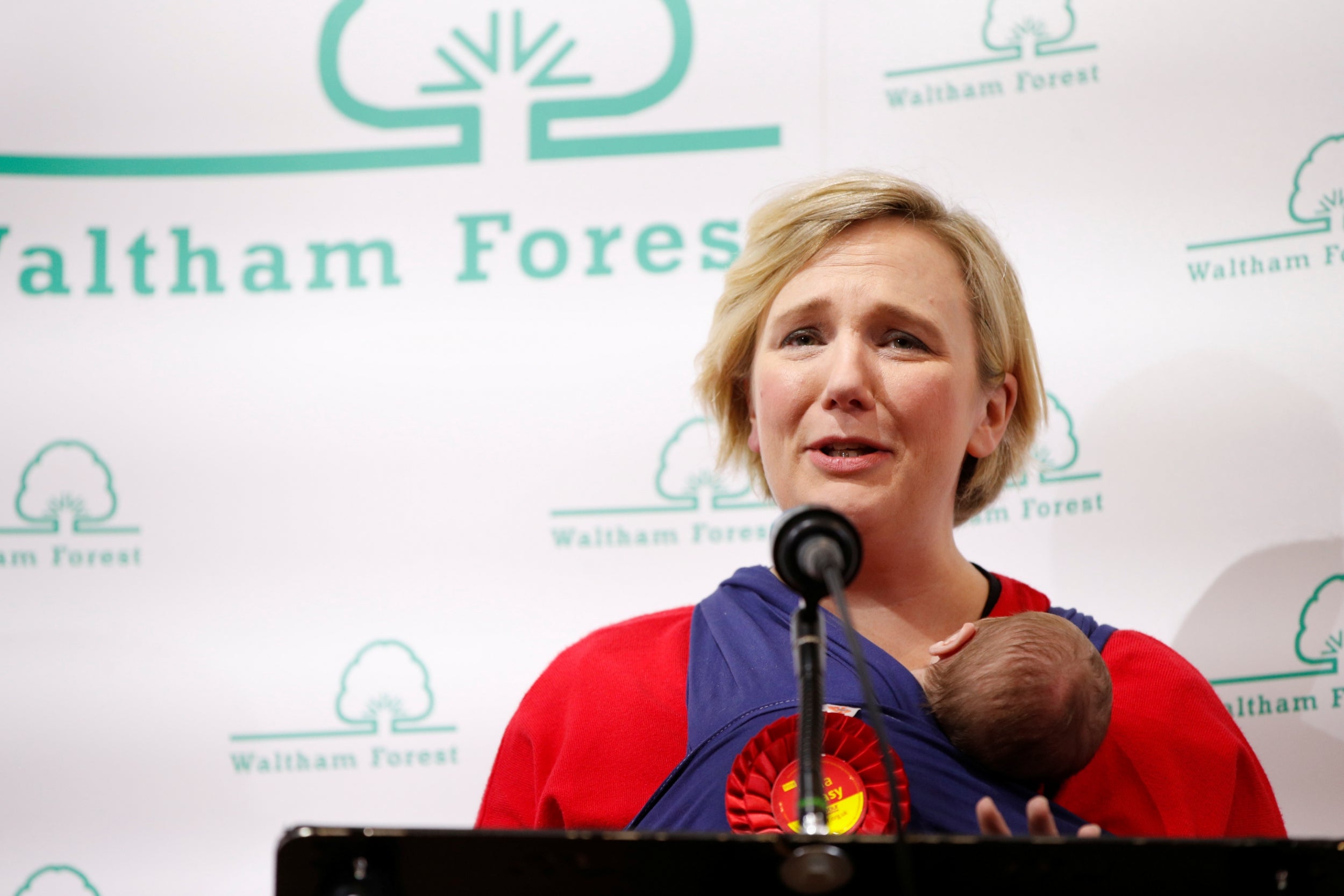
25/36
Labour candidate for Walthamstow Stella Creasy carries her baby daughter as she speaks after winning in Britain’s general election in Waltham Forest Town Hall, Walthamstow, Britain
REUTERS

26/36
The first ballot boxes for Belfast North are brought into the count centre in Belfast on December 12, 2019 to be counted for the UK general election. – Prime Minister Boris Johnson was on course for a decisive majority, exit polls indicated after voting closed in Britain’s general election on Thursday, paving the way for Brexit
AFP via Getty Images

27/36
Independent, Count Binface poses for a photograph as he waits for the results in the count centre in Uxbridge, where Britain’s Prime Minister and Conservative leader Boris Johnson hopes to hold his seat, in west London, on December 12, 2019. – Prime Minister Boris Johnson was on course for a decisive majority, exit polls indicated after voting closed in Britain’s general election on Thursday, paving the way for Brexit.
AFP via Getty Images

28/36
Ballot boxes are emptied during the count at Northumbria University’s Sports Central in Newcastle for the 2019 General Election
PA

29/36
Ballots are tallied at a counting centre for Britain’s general election in Brighton, Britain
REUTERS
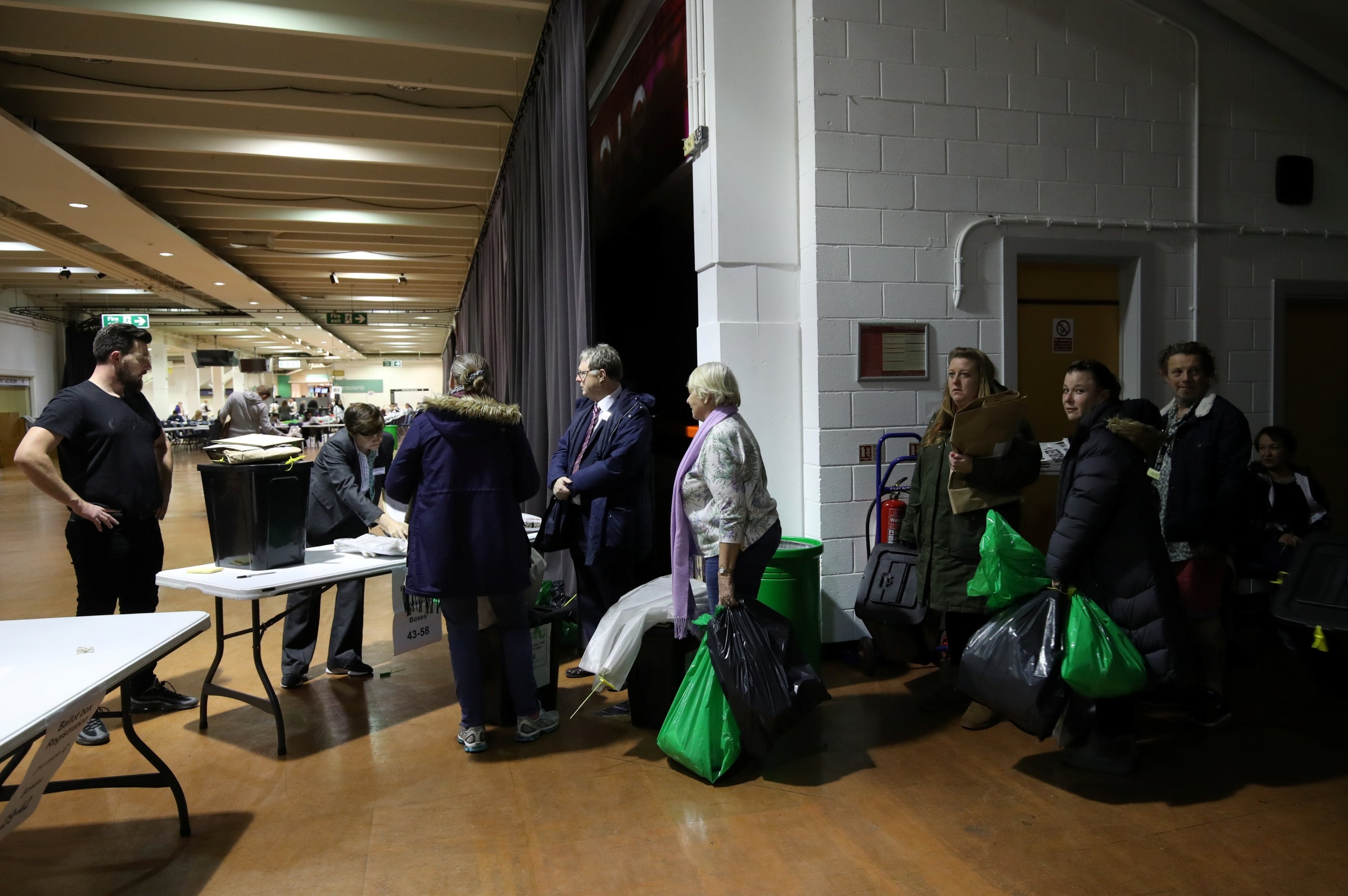
30/36
Ballots arrive at a counting centre for Britain’s general election in Esher, Britain
REUTERS

31/36
General Election 2019 – Election count at Meadowbank Sports Arena, Magherafelt for Newry & Armagh, South Antrim, North Antrim, Upper Bann, East Londonderry, Foyle, Lagan Valley and Mid Ulster.

32/36
A woman wears a rosette with the name of independent candidate Joe Bousfield on it as ballots are tallied at a counting centre for Britain’s general election in Hartlepool, Britain
REUTERS

33/36
An exit poll from Thursday’s election is projected onto Broadcasting House in London, Britain, December
Jeff Overs/BBC via REUTERS

34/36
The broadcaster’s exit poll results projected on the outside of the BBC building in London shows Britain’s Prime Minister Boris Johnson’s Conservative Party predicted to win 368 seats and a majority (L) and Jeremy Corbyn’s opposition Labour Party to win 191 seats, as the ballots begin to be counted in the general election on December 12, 2019
AFP via Getty Images
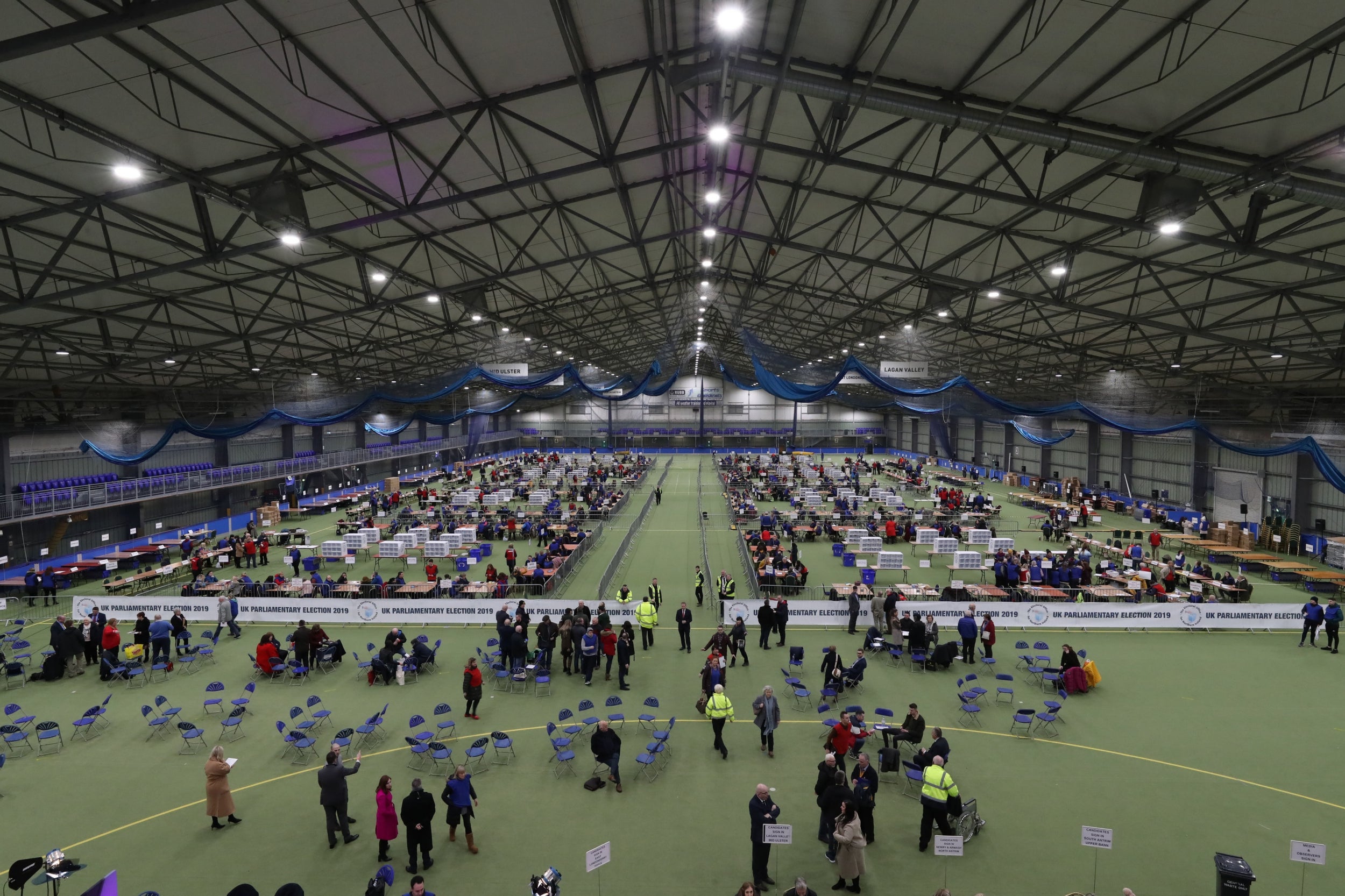
35/36
Ballot boxes are opened at Meadowbank Sports Arena in Magherafelt, Co Londonderry, as counting begins 2019 General Election.
PA

36/36
Votes are counted at the Royal Highland Centre, Edinburgh, for the UK Parliamentary General Election count
PA

1/36
First Minister Nicola Sturgeon, takes a selfie with some her newly elected MP’s at the Glasgow count
Getty

2/36
Prime Minister Boris Johnson gestures after speaking
AP

3/36
A police officer breaks up a fight while Hayes and Harlington MP John McDonnell speaks
Getty Images

4/36
Liberal Democrat candidate Luciana Berger reacts as she loses the Finchley & Golders Green constituency in north London
PA

5/36
DUP MP for Upper Bann Carla Lockhart with her son Charlie at Meadowbank Sports Arena as counting begins
PA

6/36
Labour’s John McDonnell, the Shadow Chancellor speaks after winning his constituency seat following the count declaration at Brunel University in Uxbridge, London
AP

7/36
Liberal Democrats candidate for Edinburgh West, Christine Jardine retains her seat at the Royal Highland Centre, Edinburgh
PA

8/36
PA

9/36
AP

10/36
PA

11/36
AFP via Getty Images

12/36
AFP via Getty Images

13/36
DUP leader Arlene Foster watches on as Sinn Fein candidate John Finucane is declared the winner of the north Belfast seat over DUP candidate Nigel Dodds in the Belfast count centre at the Titanic Exhibition centre on December 13, 2019 in Belfast, United Kingdom. The current Conservative Prime Minister Boris Johnson called the first UK winter election for nearly a century in an attempt to gain a working majority to break the parliamentary deadlock over Brexit. The election results from across the country are being counted and an overall result is expected in the early hours of Friday morning.
Getty Images

14/36
Ballots in a tray labelled Jo Swinson, Liberal Democrats candidate for East Dunbartonshire, are seen at a counting centre for Britain’s general election in Bishopbriggs, Britain
REUTERS

15/36
Sinn Fein’s John Finucane, the winning candidate in the Belfast North seat, with Party Vice President Michelle O’Neill and President Mary Lou McDonald, celebrates at the count centre, Titanic Quarter, Belfast, Northern Ireland
REUTERS

16/36
Scottish First Minister Nicola Sturgeon smiles as she arrives at the SEC Centre in Glasgow for the declaration in her constituency in the 2019 general election, Friday Dec. 13, 2019. An exit poll in Britain’s election projects that Prime Minister Boris Johnson’s Conservative Party likely will win a majority of seats in Parliament. That outcome would allow Johnson to fulfil his plan to take the U.K. out of the European Union next month.
AP

17/36
Conservative Party MP Dominic Raab being congratulated by Baron Badger after being re-elected to serve the constituency of Esher and Walton at Sandown Park Racecourse in Surrey at the 2019 General Election.
PA

18/36
Conservative Party parliamentary candidate Jacob Rees-Mogg makes his way to the stage at the Sports Training Village, University of Bath, on December 13, 2019 in Bath, England. The current Conservative Prime Minister Boris Johnson called the first UK winter election for nearly a century in an attempt to gain a working majority to break the parliamentary deadlock over Brexit. The election results from across the country are being counted overnight and an overall result is expected in the early hours of Friday morning.
Getty Images

19/36
Britain’s Liberal Democrat leader Jo Swinson speaks on stage after losing her seat at the East Dunbartonshire count centre in Bishopbriggs, north of Glasgow, on December 13, 2019 after votes were counted as part of the UK general election.
AFP via Getty Images

20/36
Bobby Smith, a political and fathers’ rights activist and founder and leader of the ‘Give Me Back Elmo’ party, left, and Independent candidate Count Binface stand either side of Britain’s Prime Minister and Conservative Party leader Boris Johnson wait for the Uxbridge and South Ruislip constituency count declaration at Brunel University in Uxbridge, London, Friday
AP

21/36
Labour leader Jeremy Corbyn, with wife Laura Alvarez, talks to workers as he arrives for the count at Sobell Leisure Centre for the Islington North and South constituencies for the 2019 General Election.
PA

22/36
Jeremy Corbyn, leader of the Labour Party, visits the vote count in his Islington North constituency on December 12, 2019 in London, England. Corbyn, who has held the Islington North seat since 1983, is expected to step down as leader if his party is dealt a decisive defeat by the Conservatives, led by Prime Minister Boris Johnson. The Prime Minister called the first UK winter election for nearly a century in an attempt to gain a working majority to break the parliamentary deadlock over Brexit. The election results from across the country are being counted overnight and an overall result is expected in the early hours of Friday morning.
Getty Images

23/36
Labour Party candidate Sharon Hodgson speaks after is announced as the winner for the constituency of Washington and Sunderland West at a counting centre for Britain’s general election in Sunderland, Britain
REUTERS

24/36
Labour leader Jeremy Corbyn arriving for the count at Sobell Leisure Centre for the Islington North and South constituencies for the 2019 General Election.
PA

25/36
Labour candidate for Walthamstow Stella Creasy carries her baby daughter as she speaks after winning in Britain’s general election in Waltham Forest Town Hall, Walthamstow, Britain
REUTERS

26/36
The first ballot boxes for Belfast North are brought into the count centre in Belfast on December 12, 2019 to be counted for the UK general election. – Prime Minister Boris Johnson was on course for a decisive majority, exit polls indicated after voting closed in Britain’s general election on Thursday, paving the way for Brexit
AFP via Getty Images

27/36
Independent, Count Binface poses for a photograph as he waits for the results in the count centre in Uxbridge, where Britain’s Prime Minister and Conservative leader Boris Johnson hopes to hold his seat, in west London, on December 12, 2019. – Prime Minister Boris Johnson was on course for a decisive majority, exit polls indicated after voting closed in Britain’s general election on Thursday, paving the way for Brexit.
AFP via Getty Images

28/36
Ballot boxes are emptied during the count at Northumbria University’s Sports Central in Newcastle for the 2019 General Election
PA

29/36
Ballots are tallied at a counting centre for Britain’s general election in Brighton, Britain
REUTERS

30/36
Ballots arrive at a counting centre for Britain’s general election in Esher, Britain
REUTERS

31/36
General Election 2019 – Election count at Meadowbank Sports Arena, Magherafelt for Newry & Armagh, South Antrim, North Antrim, Upper Bann, East Londonderry, Foyle, Lagan Valley and Mid Ulster.

32/36
A woman wears a rosette with the name of independent candidate Joe Bousfield on it as ballots are tallied at a counting centre for Britain’s general election in Hartlepool, Britain
REUTERS

33/36
An exit poll from Thursday’s election is projected onto Broadcasting House in London, Britain, December
Jeff Overs/BBC via REUTERS

34/36
The broadcaster’s exit poll results projected on the outside of the BBC building in London shows Britain’s Prime Minister Boris Johnson’s Conservative Party predicted to win 368 seats and a majority (L) and Jeremy Corbyn’s opposition Labour Party to win 191 seats, as the ballots begin to be counted in the general election on December 12, 2019
AFP via Getty Images

35/36
Ballot boxes are opened at Meadowbank Sports Arena in Magherafelt, Co Londonderry, as counting begins 2019 General Election.
PA

36/36
Votes are counted at the Royal Highland Centre, Edinburgh, for the UK Parliamentary General Election count
PA
The party also set up websites with titles such as “labour manifesto” and paid for Google adverts to direct people to the page, which contained a false overview of the manifesto’s contents.
Darren Hughes, Chief Executive of the Electoral Reform Society, said: “This report is a call to action, to bolster Britain’s struggling democracy. Sadly the government has often kicked the can down the road when it comes to introducing simple, consensus-driven reforms that we need – such as ‘imprints’ for online ads.
“The coronavirus crisis has shown the need for swift action to tackle misleading information online. But parties also need to put their house in order when it comes to misinformation.
“Britain’s analogue-age election campaign laws leave us open to dark ads, dodgy donations and disinformation. Campaigners and regulators have made repeated cross-party calls for action. When this crisis is over we hope to see real progress to ensure next year’s elections are truly free and fair.”


